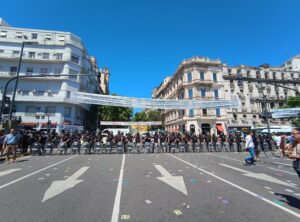Journalists and press unions in Argentina are on alert.
There was the government takeover of public media for one year and talks of privatization, the plan to suspend official advertising in media for one year and, at the beginning of February, repression of members of the press during street demonstrations against austerity measures pushed by the government of new far-right President Javier Milei.
Several organizations from the country were so concerned that they went to the Inter-American Commission on Human Rights (IACHR) and the Special Rapporteur for Freedom of Expression to talk about the state of press freedom in the country.

Argentina's Minister of Security Patricia Bullrich (Cámara de Diputados de la Nación, Public domain, via Wikimedia Commons)
And on Feb. 9, the government called a meeting between journalist associations and Minister of Security Patricia Bullrich to “analyze measures to guarantee greater security for journalists” during demonstrations and other high-risk events.
“We emphasized that the State security forces cannot repeat this type of action,” the Argentine Journalism Forum (FOPEA, for its acronym in Spanish) said in a statement following the meeting.
Bullrich apologized to journalists harmed during coverage of the demonstrations outside Congress, according to FOPEA. The minister also said they are developing a proposal to organize the work of journalists to guarantee their integrity without hindering their work, according to the organization.
Spokespersons for Bullrich said the meetings with journalists will continue, as reported by EFE.
Demonstrations against the Omnibus Bill
It happened near the Argentine National Congress, in Buenos Aires, between Jan. 31 and Feb. 2. Legislators were discussing the Bill of Bases and Starting Points for the Freedom of Argentines, popularly known as the Omnibus Bill, which Milei eventually decided to withdraw from the lower house.
The National Committee for Prevention of Torture and other civil society organizations recorded that about 285 people were injured due to the actions of the security forces and confrontation with protesters, the IACHR reported.
Thirty-five press workers were injured, including being hit with rubber bullets or tear gas.
Agustín Lecchi, general secretary of the Buenos Aires Press Union (SiPreBa), told LatAm Journalism Review (LJR) that press workers “were a favorite target of the repression orchestrated by Minister of Security Patricia Bullrich.”
This is not the first time that SiPreBa has recorded attacks on press workers by security forces. The union denounced on its website that in the street demonstration on Dec. 27 called by the CGT labor union, journalistic teams from the private television channels TN and Telefe were attacked while they were covering the mobilization.
“The press is attacked because they want to silence us so that the repression in the streets is not shown. In Argentina we are experiencing a brutal fiscal adjustment that does not pass without repression,” Lecchi said.
Met with repression on the job
“It is the first time that they have shot us directly while we are so identified as press,” Alfredo Luna explained to LJR. Luna has a long career as a photojournalist and currently works for the Télam National News Agency.
On Feb. 1, he was in charge of covering the mobilization outside Congress, during which he said he was shot with a rubber bullet in the left thigh and sprayed with tear gas that caused a lot of burning in his eyes and skin for hours.
The photojournalist said that he, as well as most of the colleagues present, were wearing t-shirts and vests on which the word press was easily identifiable. Even so, he said they shot them, cornered them and attacked them.
That day the journalist began the workday outside Congress like any other day, and he even said that the mobilization was peaceful the entire time. For him, the police repression occurred in two moments.
The first: “around 7:30 p.m., several vans with gendarmerie [specialized police] troops stopped at the door of Congress,” Luna said. “They met other members of the Federal Police and advanced with shields towards the protesters. An officer sprayed this spray that got into my eyes, so I was blinded for ten minutes. I had a lot of burning in my face and arms, but I tried to keep working.”
For the second moment, Luna was relieved by another photojournalist from the Télam Agency, in any case, he stayed to accompany him.

General strike on Jan. 24, 2024 against the government of Javier Milei and the Omnibus law (RitaStardust, CC BY 4.0 via Wikimedia Commons)
“At 8:30 p.m. we heard motorcycle noises again,” Luna said. “They made circular movements with the motorcycles and formed a circle. My partner took photos, I followed him to assist and a few minutes later a group of two or three motorcycles fired rubber bullets towards where we were. Everyone who was with us left, it was just my partner and I and two or three other photographers and they shot us again. It was a very horrible moment.”
Lorena Tapia is an editor for the Argentine Televisión Pública newscast and a union delegate for the media outlet at SiPreBa. She said she attended the mobilization outside Congress on Feb. 1 as a member of SiPreBa, wearing a t-shirt with the press logo on the back.
“It was very dramatic, there were colleagues on the floor crying. I received rubber bullets in the back, waist and buttocks,” Tapia told LJR. “Every now and then they form that circle on motorcycle to intimidate us, they use it constantly. All the security forces were in Congress. It is like oversized, a very big bet on the stage by this government.”
Tapia acknowledged that since Milei's government took office there has been repression against the press in other mobilizations, however, she said "it was not as savage as on Feb.1 and 2."
She said that in December 2017 there was also strong repression against the press in the street mobilizations against the pension reform implemented by the government of former President Mauricio Macri. That year the Minister of Security was also Patricia Bullrich.
The risk of privatizing public media and removing official advertising
“I was in the mobilization during the repression. What the national government is doing and the operation it is carrying out in the streets as a result of a protocol that is unconstitutional is brutal,” Carla Gaudensi, general secretary of the Argentine Federation of Press Workers (Fatpren), told LJR.
Gaudensi referred to the comprehensive protocol for maintaining public order (better known as “anti-picketing”), which Bullrich implemented as of December 2023 in order for the security forces to mobilize in response to blockades and demonstrations in public roads. This protocol not only “curtails the right to protest, which is a constitutional right,” as Lecchi explained, but Gaudensi said it is an “attack on the press to restrict freedom of expression and not inform what is happening with the repression.”
For her, beyond the aggression in the streets, “the new government's attack on the media began from day one, especially the public media that it is trying to privatize.”
One of the reforms of the omnibus bill that was discussed within Congress while demonstrations were happening outside, is to privatize 41 public companies, including public media.
“Public media guarantee the sovereignty of our country, there are strong public media around the world. They guarantee that the information reaches the entire country and Argentina is huge. We have to defend each radio station that transmits and communicates to each of the regions, and that is done by Televisión Pública, Radio Nacional, Télam. Today, large media corporations work from Buenos Aires without knowing what is happening in each community in the interior of the country,” Tapia said.
Another way in which the general secretary of Fatpren considered that the press in Argentina is being attacked is through the suspension of the official advertising for one year. This is one of the emergency measures that the new government took as soon as it took office as part of the adjustment plan, as announced by its spokesperson at a press conference.
“There is economic pressure on the media and managers use the pressure exerted by the government so that the workers are the ones who pay the cost,” Gaudensi said.
In addition, she said that for self-managed media the impact of cutting official advertising is even greater.
Guaudensi emphasized that a direct attack against the activities of journalists began the day Milei took office as president and prevented media and journalists from accessing the ceremonies in the Casa Rosada and Congress.
“That day was broadcast through the social networks of some presidential spokespersons. We believe that there is a use of social networks that changes the notion of how journalism should be done,” she said.
Tapia added that it is the first time in Argentina, since the return of democracy (40 years ago), that the public media were not present at the inauguration of a president.
Security measures to cover street protests
SiPreBa criminally denounced the attacks against the press in the demonstrations outside Congress on Feb. 1 and 2. In turn, together with other organizations, they denounced the Milei government's failure to comply with freedom of expression standards before the IACHR and Special Rapporteur.
“The IACHR reiterates that peaceful protest and demonstration is an essential element in democratic societies and that the State must respect, protect, facilitate and guarantee the right to freedom of expression and peaceful assembly,” the commission wrote in Feb. 8 statement.
To protect themselves during future demonstrations, those interviewed for this article said that they are taking extreme security measures.
Some of them are: reporting with press identification t-shirts and their respective credentials; trying to report in groups; keeping in touch to monitor who is reporting. In turn, Telam's photojournalist said that the media outlet bought safety equipment such as goggles, masks and helmets that journalists are already using while reporting.